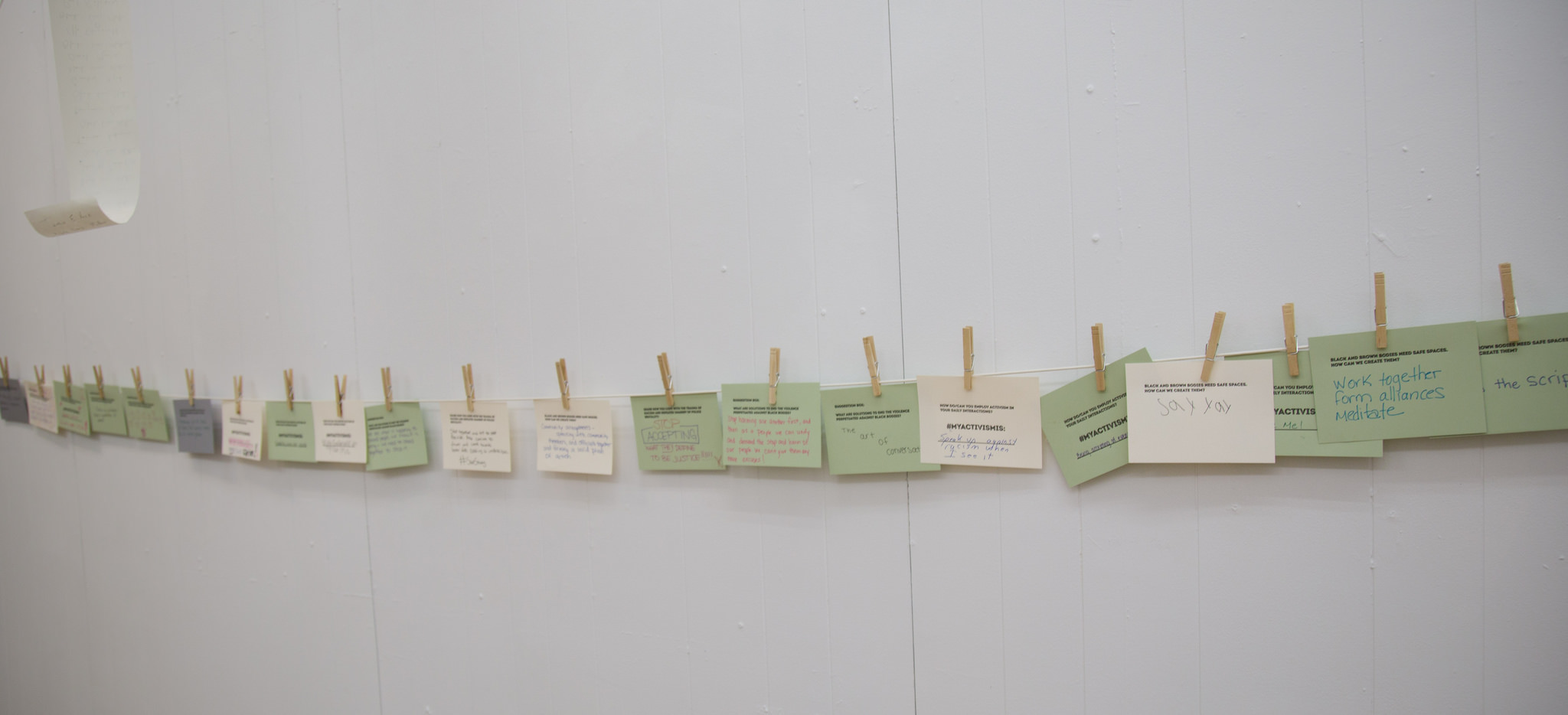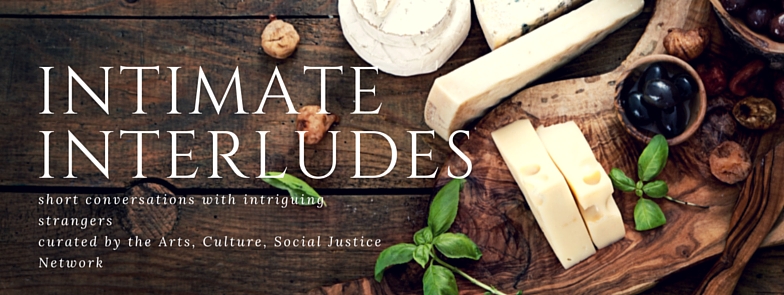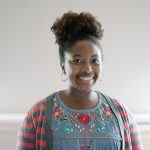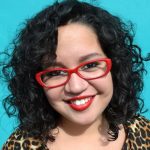Michelle Ivette Gomez and Sharbreon Plummer discuss soul feeding work, self-care, blackness and the importance of connecting locally and globally to movements of resistance.
Both of you wear so many hats, what are you up to right now?
S: Professionally, I’m continuing my work at the Joan Mitchell Center, supporting artists and our local community, creating spaces for collaboration and exploration through our residency and public programs. I’m also engaged in my own practice of art-making and research (curatorial and personal), both as a business owner/metalsmith and mixed media artist.
M: I’m taking somewhat of a break right now since I recently moved back home to Miami. After graduating almost 3 years ago, I’m questioning how much more community focused work I can do while balancing ways to survive in the nonprofit world. In addition, I am reflecting on my past work, questioning my own intentions, and questioning the intentions of arts leaders in my field.

Sharbreon Plummer #MYACTIVISMS: Clothesline Conversations : What Does #blacklivesmatter Mean to You? group exhibition ” February 2016 MCLA Gallery 51
What work are you currently doing that is feeding your artistic soul?
S: It’s two-fold; The act of “making” is helping to feed it, as well as pushing myself to be consistent with the process. Many times working to engage with so many people can be taxing on an energetic level; being a giver and someone that wants to do a good job pushes and challenges me in a variety of ways. So I have to stay on top of pushing myself to unplug and create things or engage in leisurely activities that don’t keep me on the same deadlines but are still of deep interest to me. I think it’s important to continue the process of figuring out what that long term sustained self care looks like; because once I start to implement those things, I then have the space to feel inspired to create and “do”.
M: Yes, you have to have your oxygen mask first before you give it to someone else! I love how when I asked you that question, you didn’t go to a specific objective role, but rather talked about your personal healing process. I appreciate that because I’m paralleling that as well. The work that is feeding my artistic soul right now isn’t actually work centered around producing an object, but the internal work. I don’t know if it’s artistic…I guess it is because healing is artistic. Going to the beach and being mindful of my present surroundings is an artistic sort of performance and ritual; putting on my suntan lotion, going in the water, taking a rest, and repeating; using the ocean as a performative space…that’s where my artistic side comes out.
S: Yes! As women of color, ritual is embodied within us. The ways in which we care for our bodies/selves is key. All of that is important.
M: It is! I came home to heal, so I like that. It’s now become a priority before the “other work”.

Michelle Ivette Gomez “Cutz: Black Men in Focus”, a solo exhibition by Gracie Xavier, October 2015, Baltimore, MD
What social issue is burning hottest for you right now? How do you engage with it in your artistic practice and your public work?
S: The rejection of blackness. That’s the best way I can put it. One thing that I struggle with right now is this ongoing need for society to box things and I’m not big on compartmentalization, so I just call it the rejection of blackness in all of its forms: whether it would be through police brutality, appropriation, all of it. That’s important to me because I experience it on a daily basis in my personal and professional life. I know thousands of people both here and within my extended global family that are going through the same thing, so I feel like within my practice, I try to make and do work that’s unapologetic. I make things that are true and honest for me and the people around me; meaning I don’t really care if other people get it or not, I don’t care of people are offended or not, I don’t even care of think it’s interesting or not because it’s really not for you. Right now I’m also spending more time researching adornment and craft, especially within the African Diaspora.
M: There’s many layers, they are all interesting you know, I can’t determine what’s hot. Collaboration and empathy is key towards determining what social issues are relevant. Right now, it’s police brutality. It’s my fear that Miami is apathetic towards Black Lives Matter, it’s rising sea levels, at the same time, specially for S. FL, and the Gulf, we’re all disappearing in various ways. I’m afraid that the areas where there are more concentrated populations of Black people or Latino people will be most affected by rising sea levels and other environmental catastrophes. Literally the world is not supporting our archives, our histories, whatever we worked hard for, it will go underwater anyways. So it’s all intersecting. I still struggle with issues around Latino identity and I am still learning because I am trying to decolonize what I learned about art and curatorial practice in school. I’m also, thinking about Latino allyship, with Black Lives Matter, and I really I would really like to see how can I implement more of that in my curatorial practice. Especially since Black Lives Matter released their new manifesto which also includes a focus on immigration and deportation, to recognize that Black people go through that as well, that’s its not just light skinned Caribbeans and Latin Americans, it’s everywhere. It’s a global issue.
Sharbreon Plummer
Sharbreon Plummer is an artist and creative practitioner with an interest in how culture and ancient practices act as influencers of personal expression, specifically within the African + Latin American Diasporas. Her practice is a combination of research, creation, and participation, and incorporates the inclusion of others as a way to build dialogue and/or visibility around contemporary issues. She believes that artistic expression is a driving force that aids in the exploration and development of our best selves. In addition to acting as the Program Associate for Community Engagement at the Joan Mitchell Center, an Artist Residency Program based in New Orleans, LA, she continues to explore her personal practice and independent projects through The Creative Apothecary, an experimental platform she founded in 2013.
Michelle Ivette Gomez
Michelle Ivette Gomez is an independent curator, arts organizer, creative consultant, and artist who advocates for audience diversity and inclusion within the arts. Originally from Miami, FL, she moved to Baltimore, MD in 2008 to pursue her BFA and MFA in Curatorial Practice from the Maryland Institute College of Art where she focused on expanded methods of art presentation and co-creative community-focused exhibitions. She recently moved back to Miami, FL where she is currently the Curatorial Manager for The Museum of Impact and a co-founder of Museum Workers Speak Miami. She continues to work as an independent curator, arts organizer, and creative consultant with the hopes of promoting dialogue and action around arts activism in the Miami arts community, and bringing Community | Art | Exhibitions to her own native hometown. For more information, please visit www.michelleigomez.org.
To participate in an Intimate Interlude, please e-mail [email protected]



Leave a Reply